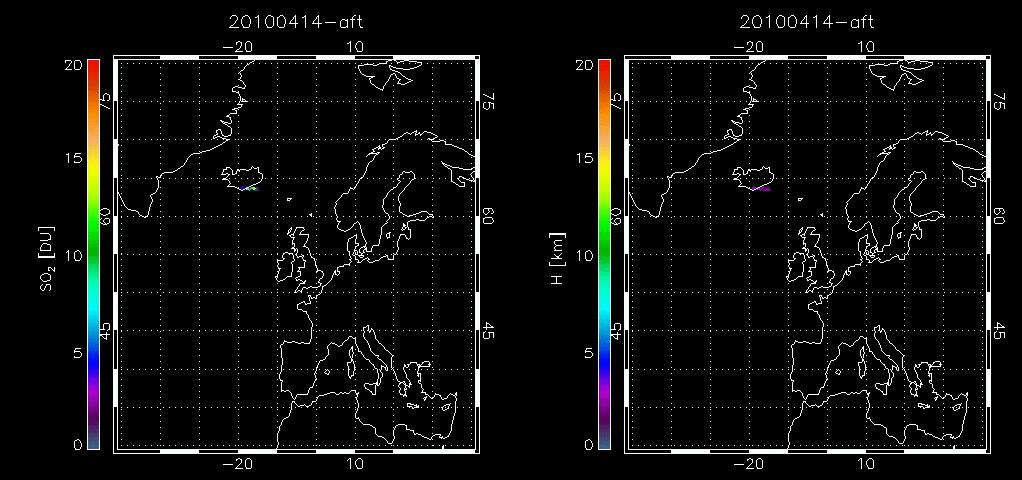Eyjafjallajokull: Difference between revisions
No edit summary |
|||
| (9 intermediate revisions by 3 users not shown) | |||
| Line 1: | Line 1: | ||
{{Infobox volcano | {{Infobox volcano | ||
| name = | | name = Eyjafjallajökull | ||
| elevation_m = 1666 | | elevation_m = 1666 | ||
| lat_d = 63 | | lat_d = 63 | ||
| Line 12: | Line 12: | ||
}} | }} | ||
''' | '''Eyjafjallajökull''' is a is a stratovolcano, located close to Iceland’s southern coast. | ||
===Eruption April May 2010=== | ===Eruption: April and May 2010=== | ||
The volcano entered a precursor eruptive phase on 20 March 2010 that included lava flows but no significant ash and SO<sub>2</sub> emission. Following earthquake activity an explosive eruption began on the 14 April 2010. | The volcano entered a precursor eruptive phase on 20 March 2010 that included lava flows but no significant ash and SO<sub>2</sub> emission. Following earthquake activity an explosive eruption began on the 14 April 2010. | ||
The explosive part of the eruption can be divided into three phases (Zehner, | The explosive part of the eruption can be divided into three phases (Zehner, 2012; Stevenson et al., 2012; Petersen et al., 2012): | ||
2012; Stevenson et al., 2012; Petersen et al., 2012): | |||
Phase I: | Phase I: 14 – 18 April. Phreatomagmatic eruption phase; ice and water directly in contact with the fresh magma in the vent. Large amount of ash injected in the atmosphere, as well as steam plumes. The injection altitude of the plume is estimated between 2 and 10 km height (Marzano et al, 2011; Stohl et al., 2011) | ||
Phase II: 18 | Phase II: 18 April – 4 May. Magmatic eruption phase; lower intensity of the eruption; altitude of the eruption column is between 2 and 5 km (Zehner et al, 2010; Stohl et al., 2011). | ||
Phase III: 5 | Phase III: 5 – 24 May. Magmatic eruption phase; more intense explosive phase; ash production and SO<sub>2</sub> increase; eruption column altitude is reported between 4 and 10 km (Stohl et al., 2011). | ||
[[File:Eyja.gif|frame|left|IASI SO<sub>2</sub> retrieved amount [DU] and altitude [km] for the period 14 April to 17 May 2010 (Carboni et al 2012)]] | [[File:Eyja.gif|frame|left|IASI SO<sub>2</sub> retrieved amount [DU] and altitude [km] for the period 14 April to 17 May 2010 (Carboni et al 2012)]] | ||
IASI SO<sub>2</sub> amount and altitude retrieved following Carboni et al 2012. <ref> Carboni, E., R.G. Grainger, J.C. Walker, A. Dudhia and R. Siddans, A new scheme for sulphur dioxide retrieval from IASI measurements: application to the Eyjafjallajökull eruption of April and May 2010, Atmospheric Chemistry and Physics, 12, 11417—11434, 2012. [http://www.atmos-chem-phys.net/12/11417/2012/acp-12-11417-2012.html (ACP)]</ref> | |||
Analysis of the IASI retreival for Eyjafjallajokull eruption, together with estimate of total mass of SO<sub>2</sub> and comparison with other satellite data in Carboni et al 2012. | |||
==Links== | |||
[http://www.atmos-chem-phys.net/special_issue212.html ACP Special Issue: Atmospheric implications of the volcanic eruptions of Eyjafjallajökull, Iceland 2010] | |||
[http://onlinelibrary.wiley.com/journal/10.1002/%28ISSN%292156-2202d/specialsection/ICEVOLCAN1 JGR Special Issue: The Eyjafjallajökull Volcanic Eruption in 2010] | |||
==References== | ==References== | ||
Latest revision as of 14:40, 5 March 2014
| Eyjafjallajökull | |
|---|---|
| Elevation | 1666 m |
| Latitude | 63° 38′ ″ N |
| Longitude | 19° 36′ ″ W |
Eyjafjallajökull is a is a stratovolcano, located close to Iceland’s southern coast.
Eruption: April and May 2010
The volcano entered a precursor eruptive phase on 20 March 2010 that included lava flows but no significant ash and SO2 emission. Following earthquake activity an explosive eruption began on the 14 April 2010. The explosive part of the eruption can be divided into three phases (Zehner, 2012; Stevenson et al., 2012; Petersen et al., 2012):
Phase I: 14 – 18 April. Phreatomagmatic eruption phase; ice and water directly in contact with the fresh magma in the vent. Large amount of ash injected in the atmosphere, as well as steam plumes. The injection altitude of the plume is estimated between 2 and 10 km height (Marzano et al, 2011; Stohl et al., 2011)
Phase II: 18 April – 4 May. Magmatic eruption phase; lower intensity of the eruption; altitude of the eruption column is between 2 and 5 km (Zehner et al, 2010; Stohl et al., 2011).
Phase III: 5 – 24 May. Magmatic eruption phase; more intense explosive phase; ash production and SO2 increase; eruption column altitude is reported between 4 and 10 km (Stohl et al., 2011).
IASI SO2 amount and altitude retrieved following Carboni et al 2012. [1]
Analysis of the IASI retreival for Eyjafjallajokull eruption, together with estimate of total mass of SO2 and comparison with other satellite data in Carboni et al 2012.
Links
JGR Special Issue: The Eyjafjallajökull Volcanic Eruption in 2010
